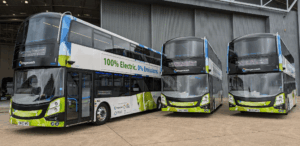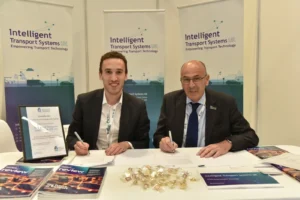The UK’s Intelligent Transport Society has responded to a government consultation about the future of transport by backing the use of technology to deliver flexible bus services.
The consultation questioned whether regulation needs to be updated and the Society’s response team backed such a change. They suggested that operators could be able to drive on a fixed route, but by using live navigation, vary it depending on the demands of passengers booking trips using some sort of app.
The response suggested that real-time information would enhance the passenger experience, as would flexibility on pick-up time, particularly on return journeys. Therefore the ability to book 20 minutes ahead as on more recent services would be ideal, compared with earlier flexible services which required bookings a day in advance.
They also said that it is important child and concessionary fares are still honoured by flexible bus service providers. Regarding funding, the respondents wrote, “Expenditure and benefits on demand responsive and other service types should be assessed… to ensure a rational allocation of resources. In theory, services in urban areas of higher density might become commercially viable but there is no experience to date.”
Elsewhere in the response, the ITS (UK) experts were reluctant to support micromobility use – such as e-scooters – on mixed traffic roads, based on the potential risk to those road users trying to share with large, fast vehicles. They suggested any standards must be focused on interactions with these other road users.
Asked about Mobility as a Service, the respondents urged authorities to be clear on what they want from MaaS platforms in order to ensure developments fully align mobility policies. They also said that competition must be ensured in order to encourage innovation and create a strong sustainable supplier base. “There is a key role here for setting open standards and also for making data available to facilitate the development of new platforms,” they wrote.
“These responses to Government consultations are one of the things that ITS (UK) does on behalf of members, usually carrying much more weight than if the individual members submitted their own responses,” explained ITS (UK) Secretary General Jennie Martin. “We take a pragmatic approach to transport consultations, while reminding decision makers how technology is usually a quick, efficient and cost-effective way of delivering their goals. My sincere thanks go to all the members who gave their time and expertise to deliver our response, showing once again that ITS (UK) is more than the sum of its parts.”
The members involved in the response were made up of Keelan Fadden-Hopper of TfWM, Alan Stevens of Southampton University, Peter White, an Emeritus Professor at Westminster University, Andrew Pearce of Jacobs, Fraser Sommerville of SNC Lavalin Atkins, and Mike Burden of Burden Consulting through ITS (UK)’s Public Transport and Mobility as a Service Forums.
(Picture: Example of ViaVan shared ride service in Milton Keynes)























